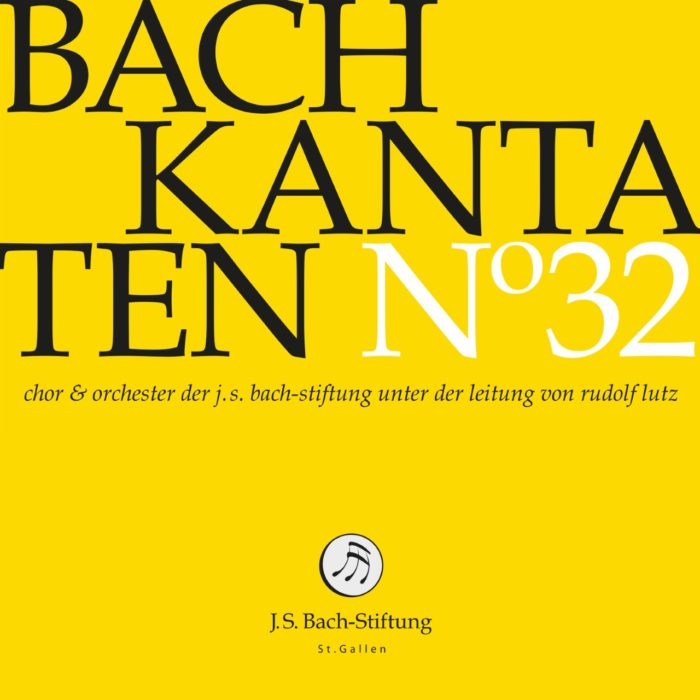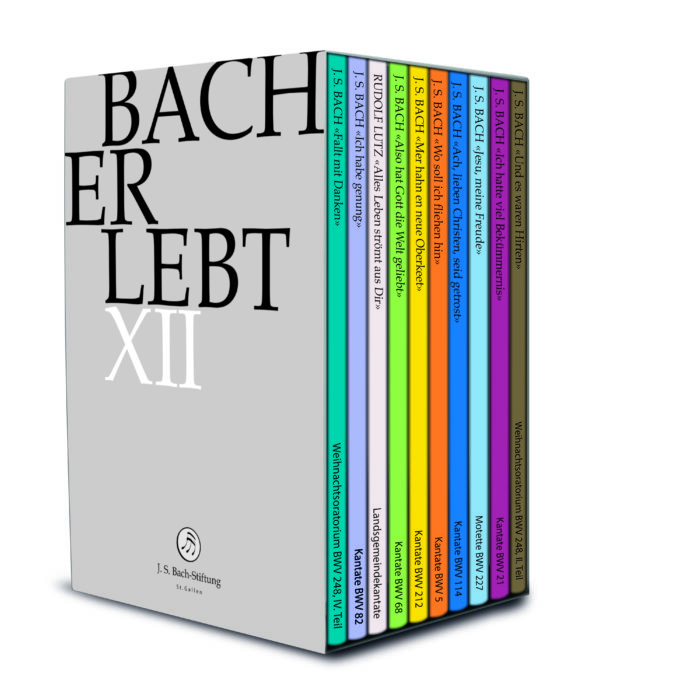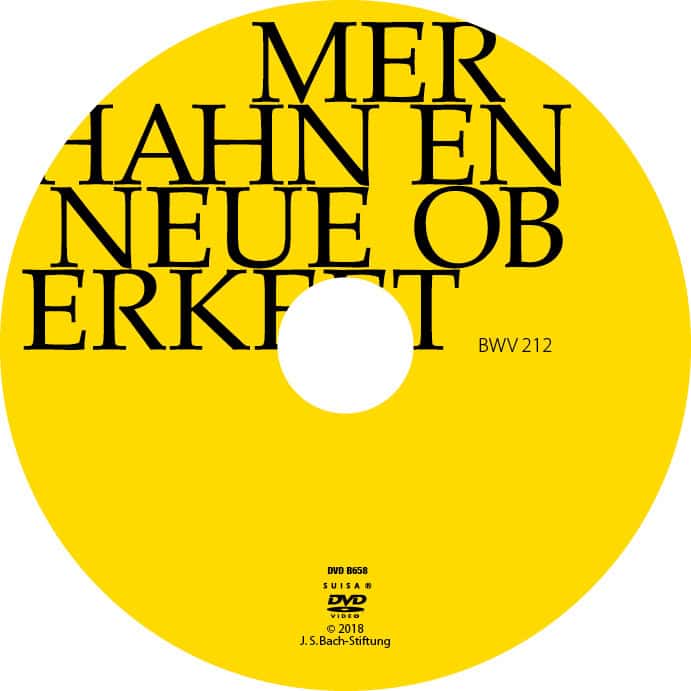Mer hahn en neue Oberkeet
BWV 212 // Cantate burlesque
(We’ve got a bran-new guvernor) for soprano and bass, transverse flute, corno, strings and basso continuo

Would you like to enjoy our videos ad-free? Subscribe to YouTube Premium now...
Workshop
Reflective lecture
Bonus material
Orchestra
Conductor
Rudolf Lutz
Violin
Renate Steinmann, Monika Baer
Viola
Susanna Hefti
Violoncello
Martin Zeller
Violone
Markus Bernhard
Corno
Olivier Picon
Transverse flute
Tomoko Mukoyama
Bassoon
Susann Landert
Lute & guitar
Julian Behr
Musical director & conductor
Rudolf Lutz
Workshop
Participants
Rudolf Lutz, Olivier Picon and Noldi Alder
Reflective lecture
Speaker
Noldi Alder
Recording & editing
Recording date
29.06.2018
Recording location
Chäserrugg
Sound engineer
Stefan Ritzenthaler, Nikolaus Matthes
Director
Meinrad Keel
Production manager
Johannes Widmer
Production
GALLUS MEDIA AG, Switzerland
Producer
J.S. Bach Foundation of St. Gallen, Switzerland
Librettist
Text
Christian Friedrich Henrici (Picander)
First performance
30 August 1742, Klein-Zschocher near Leipzig
In-depth analysis
Bach’s Cantata Burlesque BWV 212 (“Mer hahn en neue Oberkeet” – We’ve got a bran-new guvernor) was first performed on 30 August 1742 and is Bach’s last known cantata. The work was composed for the celebration of hereditary homage bestowed on Carl-Heinrich von Dieskau as the new estate holder of the village of Kleinzschocher, which at that time still lay outside the city of Leipzig. As electoral chamberlain and maître de plaisir at the Court of Dresden, Dieskau was an influential personage. And although the occasional use of dialect in the libretto obscures the situation somewhat, it was likely not the greater farmers of the village but rather the poet Picander himself who commissioned the music for his text, which was later printed as part of his “Ernst-Scherzhafften und Satyrischen Gedichte” (serious-humorous and satirical poems, volume V, Leipzig 1751). Indeed, as a tax official, Picander was in the employ of Dieskau, the district prefect responsible for taxation, which explains not only the use of tax jargon in the libretto, but also its personal character.
While the instrumental overture scored for violin, viola and continuo invokes the crude simplicity of peasant tavern music, the setting’s seven-part sequence of melodies from popular tunes (some of which are yet to be identified) actually proves to be a skilful quodlibet written in the style of the programme sonatas by Farina and Biber. The movement sets the stage for a succession of short, contrasting vocal movements that, in a dialogue between the peasant girl Mieke and her unnamed lover, include frequent allusions to the local area.
The first scene introduces both the festivities and the protagonists. With its syllabic declamations, the opening duet praises the generous squire, mocks the moralising pastor and summons the minstrels to merry music-making ere, in a burlesque setting, the seemingly virtuous Mieke rebuffs the advances of her companion by pointing out the presence of the chamberlain and his watchful eye. The chamberlain, however, is then declared to be an even greater rake himself, a play on the cliché of the gallant aristocrat that inspires Mieke, in a polonaise-like arietta, to wax lyrical on the joys of love.
The second section deals with matters of village economics and governance. In recitative number five, the lamented harshness of the local “Schösser” (taxman) is presented as a variation on the classical topos of the benevolent ruler and his tyrannical advisor. Nonetheless, coming from the pen of Picander – a taxman himself – this could have been a hidden compliment intended for the ears of Dieskau: the recent fines for fishing offences were evidence that swift action would be taken to protect the rights of the squire. The ensuing aria thus appeals with ironic aplomb for a more benevolent treatment of the peasants, and the canonic sequences of this section allude to the nominal severity of a law that is open to interpretation, thus lending the contrast between rustic delivery and ornamented music a further layer of wit.
Opening with recitative number seven, the third section combines flattering praise of the ruler with concealed reminders hinting at the limits of the peasants’ patience. Mieke’s pronouncement that “unser Herr der beste” (our master is the best) and not to be bought for all the world is elaborated in the aria “Unser trefflicher lieber Kammerherr” (This our excellent, honoured chamberlain), a series of variations over the well-known Folia bass that, set in B minor, wavers between pathos and elegy. In light of the ancestral pride of the Dieskau family, it is not impossible to interpret this use of the “Folies d’espagne” as a nod to the heroic deeds of a Dieskau forefather who served for the Spanish kings Karl and Ferdinand in the Turkish war of the 16th century, although the link – in a movement sung by the naïve Mieke – seems almost comically absurd.
The bass recitative number nine enumerates the count’s good deeds: not only is the chamberlain honest, but he also ensured that the village was protected during the most recent recruitment – and will hopefully do the same during the upcoming tax assessment. For these sentiments, Bach created a chaconnelike aria that both vaunts Dieskau’s finesse (“das ist galant” – that is gallant) and gloats over the envious neighbouring villages of Knauthain und Cospuden. Following the tongue-in-cheek references to legal tax tricks based on the false declaration of barren land (“caduke schocken” – evaded taxes), the countess is then styled as the kindly, modest friend of the village community. While that is hardly credible, there was no harm in suggesting she may have an economising influence on her noble husband; here, the “arm und grobe Holz” (poor and rough wood) of the peasant petitioners is alluded to by the use of diminished intervals. The bass aria number 12, reminiscent of a dancing bear, neatly summarises this objective: a one-off homage celebration may well cost 50 thaler – in future, however, discipline must be maintained to offset the squandered money!
After this wry exposé of the ruling classes, the two protagonists, in a fourth scene, play off the rivalry between city and country manners. Initially, Mieke wishes to show off her command of Leipzig sophistication, and Bach obliges her with a flowing aria in minuet-style that, with its graceful flute lines and delicate pizzicati, exudes considerable noblesse. Indeed, her elegant posturing is exposed only by the incongruous metaphor of the libretto: “Kleinzschocher müsse so zart und süsse wie lauter Mandelkerne sein” (Klein-Zschocher ever be sweet and tender as purest almonds to the taste). For this setting, Bach evidently reused the music of the aria “Ich will ihn hegen, ich will ihn pflegen” (I will extol him, I will attend him) from the homage cantata “Es lebe der König, der Vater im Lande” (Long life to the King now, the nation’s true father) of 1732, of which only the libretto survives.
The bass is forced to concede that Mieke’s airs and graces have not been wholly ineffectual: first he mocks her (“das ist zu klug vor dich” – That’s much too smart for thee) and puts her firmly back in her place (“wir Bauern singen nicht so leise” – We peasants sing with much more passion). But then, his own rendition of the popular melody “Es nehme zehntausend Dukaten der Kammerherr allezeit ein” (We hope now that ducats ten thousand, Our Chamberlain ev’ry day gain!), accompanied by the horn, is so bungling that Mieke, concerned for the sensibilities of the distinguished guests, gives him a thorough dressing down (das klingt zu liederlich – that sounds too uncouth). She herself then makes use of a stratagem still popular in the tabloid press of today: she professes not to say anything too embarrassing – and then proceeds to do precisely that by singing “Gib Schöne viel Söhne” (Give us, Lady, many a laddie), which echoes the familiar discourse on a noblewoman’s “virtue” by recommending that the lady finally bear an heir (“dies wünschen sich Zschocher und Knauthain fein bald” – For this boon both Zschocher and Knauthain would call!). This song inspires the bass to sing a city tune himself. For him, Bach revives the aria “Zu Tanze, zu Sprunge” (For dancing, for prancing) from the moral cantata “Der Streit zwischen Phöbus und Pan” (The Contest between Phoebus and Pan) BWV 201; while the setting gains musical brilliance from the solo violin accompaniment, the affected coloraturas bear considerable potential for irony. From our present-day standpoint, it is impossible to determine whether the intricate counterpoint and the somewhat dry flattery of the middle section allude to the aristocratic background of the countess, already once a widow, or rather to Dieskau’s accomplishments.
In the closing scene, it is high time to remove to the village tavern, the newly renovated “Grauer Wolf”. With the words “Und dass ihrs alle wisst, es ist nunmehr die Frist zu trinken” (And that ye all may know, It is now time to go for drinking) Mieke invites the guests to make a sign to order the first round, while the final recitative number 23 bids, in the sense of a lieto fine, even the notorious foes of the peasants, the taxman Picander and the notary Herr Ludwig, to join the merrymaking – a boozy act of reconciliation, considering that the two gentlemen stood to profit from the tax on drink. In the rambunctious canon of the closing duet, the work finally comes full circle: with the reference to the “Tudelsack” (bagpipes) the musicmaking is passed over to the village musicians. To fill out the sparse tutti writing in this movement, our recording features a cheerful horn part composed by Rudolf Lutz.
Libretto
1. [ ohne Satzbezeichnung ]
2. Arie (Duett)
Mer hahn en neue Oberkeet
an unsern Kammerherrn.
Ha gibt uns Bier, das steigt ins Heet,
das ist der klare Kern.
Der Pfarr‘ mag immer büse tun;
ihr Speelleut, halt euch flink!
Der Kittel wackelt Mieken schun,
das klene luse Ding.
3. Rezitativ
Bass
Nu, Mieke, gib dein Guschel immer her;
Sopran
Wenn‘s das alleine wär!
Ich kenn dich schon, du Bärenhäuter,
du willst hernach nur immer weiter.
Der neue Herr hat ein sehr scharf Gesicht.
Bass
Ach! unser Herr schilt nicht;
er weiß so gut als wir, und auch wohl besser,
wie schön ein bißchen Dahlen schmeckt.
4. Arie
Ach, es schmeckt doch gar zu gut,
wenn ein Paar recht freundlich tut;
ei, da braust es in dem Ranzen,
als wenn eitel Flöh und Wanzen
und ein tolles Wespenheer
miteinander zänkisch wär.
5. Rezitativ
Der Herr ist gut: Allein der Schösser,
das ist ein Schwefelsmann,
der wie ein Blitz ein neu Schock strafen kann,
wenn man den Finger kaum ins kalte Wasser
steckt.
6. Alt
Ach, Herr Schösser, geht nicht gar zu schlimm
mit uns armen Bauersleuten üm!
Schont nur unsrer Haut;
freßt ihr gleich das Kraut
wie die Raupen bis zum kahlen Strunk,
habt nur genung!
7. Rezitativ
Es bleibt dabei,
daß unser Herr der beste sei.
Er ist nicht besser abzumalen
und auch mit keinem Hopfensack voll Batzen
zu bezahlen.
8. Arie
Unser trefflicher,
lieber Kammerherr
ist ein kumpabler Mann,
den niemand tadeln kann.
9. Rezitativ
Bass
Er hilft uns allen, alt und jung.
Und dir ins Ohr gesprochen:
Ist unser Dorf nicht gut genung
letzt bei der Werbung durchgekrochen?
Sopran
Ich weiß wohl noch ein besser Spiel,
der Herr gilt bei der Steuer viel.
10. Arie
Das ist galant,
es spricht niemand
von den caducken Schocken.
Niemand redt ein stummes Wort,
Knauthain und Cospuden dort
hat selber Werg am Rocken.
11. Rezitativ
Und unsre gnädge Frau
ist nicht ein prinkel stolz.
Und ist gleich unsereins ein arm
und grobes Holz,
so redt sie doch mit uns daher,
als wenn sie unsersgleichen wär.
Sie ist recht fromm, recht wirtlich und genau
und machte unserm gnädgen Herrn
aus einer Fledermaus viel Taler gern.
12. Arie
Fünfzig Taler bares Geld
trockner Weise zu verschmausen,
ist ein Ding, das harte fällt,
wenn sie uns die Haare zausen,
doch was fort ist, bleibt wohl fort,
kann man doch am andern Ort
alles doppelt wieder sparen;
laßt die fünfzig Taler fahren!
13. Rezitativ
Im Ernst ein Wort!
Noch eh ich dort
an unsre Schenke
und an den Tanz gedenke,
so sollst du erst der Obrigkeit zu Ehren
ein neues Liedchen von mir hören.
14. Arie
Klein-Zschocher müsse
so zart und süße
wie lauter Mandelkerne sein.
In unsere Gemeine
zieh heute ganz alleine
der Überfluß des Segens ein.
15. Rezitativ
Das ist zu klug vor dich
und nach der Städter Weise;
wir Bauern singen nicht so leise.
Das Stückchen, höre nur, das schicket
sich vor mich!
16. Arie
Es nehme zehntausend Dukaten
der Kammerherr alle Tag ein!
Er trink ein gutes Gläschen Wein,
und lass es ihm bekommen sein!
17. Rezitativ
Das klingt zu liederlich.
Es sind so hübsche Leute da,
die würden ja
von Herzen drüber lachen;
nicht anders, als wenn ich
die alte Weise wollte machen:
18. Arie
Gib, Schöne,
viel Söhne
von artger Gestalt,
und zieh sie fein alt;
das wünschet sich Zschocher und Knauthain
fein bald!
19. Rezitativ
Du hast wohl recht.
Das Stückchen klingt zu schlecht;
ich muss mich also zwingen,
was Städtisches zu singen.
20. Arie
Dein Wachstum sei feste und lache vor Lust!
Deines Herzens Trefflichkeit
hat dir selbst das Feld bereit‘,
auf dem du blühen musst.
21. Rezitativ
Sopran
Und damit sei es auch genung.
Bass
Nun müssen wir wohl einen Sprung
in unsrer Schenke wagen.
Sopran
Das heißt, du willst nur das noch sagen:
22. Arie
Und dass ihr‘s alle wißt,
es ist nunmehr die Frist
zu trinken.
Wer durstig ist, mag winken.
Versagt‘s die rechte Hand,
so dreht euch unverwandt
zur Linken!
23. Rezitativ
Bass
Mein Schatz! erraten!
Sopran
Und weil wir nun
dahier nichts mehr zu tun,
so wollen wir auch Schritt vor Schritt
in unsre alte Schenke waten.
Bass
Ei! hol mich der und dieser,
Herr Ludwig und der Steur-Reviser
muß heute mit.
24. Chor
Wir gehn nun, wo der Tudelsack
in unsrer Schenke brummt.
Und rufen dabei fröhlich aus:
Es lebe Dieskau und sein Haus,
ihm sei beschert,
was er begehrt,
und was er sich selbst wünschen mag!





